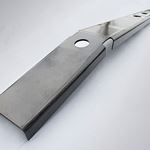Development of composite 'pylon upper spar'
April 2017
 NLR has developed a large composite ‘pylon upper spar’, a structure to which the engine of an aircraft is affixed. It is the first time that an institute has succeeded in automatically developing such a long and thick composite aircraft part made of thermoplastic. The part is 6 metres long and 28 millimetres thick. Using a pylon upper spar made of composite instead of steel allows aircraft manufacturers to reduce production costs and weight, and thus save on fuel consumption of aircraft. The pylon upper spar is expected to go into production around 2025. The pylon will be on show at JEC World, an international composites trade fair to be held in Paris from 14 to 17 March 2017.
NLR has developed a large composite ‘pylon upper spar’, a structure to which the engine of an aircraft is affixed. It is the first time that an institute has succeeded in automatically developing such a long and thick composite aircraft part made of thermoplastic. The part is 6 metres long and 28 millimetres thick. Using a pylon upper spar made of composite instead of steel allows aircraft manufacturers to reduce production costs and weight, and thus save on fuel consumption of aircraft. The pylon upper spar is expected to go into production around 2025. The pylon will be on show at JEC World, an international composites trade fair to be held in Paris from 14 to 17 March 2017.
The pylon upper spar was developed under the Dutch TAPAS 2 programme (Thermoplastic Affordable Primary Aircraft Structure), a collaborative venture between the Dutch private sector, various knowledge organisations, and Airbus. In one of the sub-projects, NLR conducted research into the development and automated production of large and thick thermoplastic composite aircraft parts. Most pylons are made of steel or titanium on account of the high temperatures near an aircraft engine. For its pylon upper spar, NLR used the reasonably heat-proof thermoplastic PEKK material made by TenCate, a Dutch composites manufacturer. Using its advanced fibre placement machine, NLR laid elongated thermoplastic tracks alongside each other and subsequently ‘fused’ them to form a pylon upper spar in Fokker’s autoclave, a kind of pressure vessel.
The manufacturing of a composite pylon upper spar is more sustainable than making a structure that contains steel. The cutting leaves little residual material, and what does remain is recyclable. The pylon upper spar itself can also be completely shredded and reused at the end of its service life. The technique devised by NLR is also suitable for other aircraft parts, such as wing spars, stabiliser spars and floor beams, and there are also applications outside the aviation sector. NLR is thus making a contribution to the innovative and competitive capabilities of Dutch industry and to the retention of high-quality employment opportunities in the Netherlands.
 Nederlands
Nederlands











